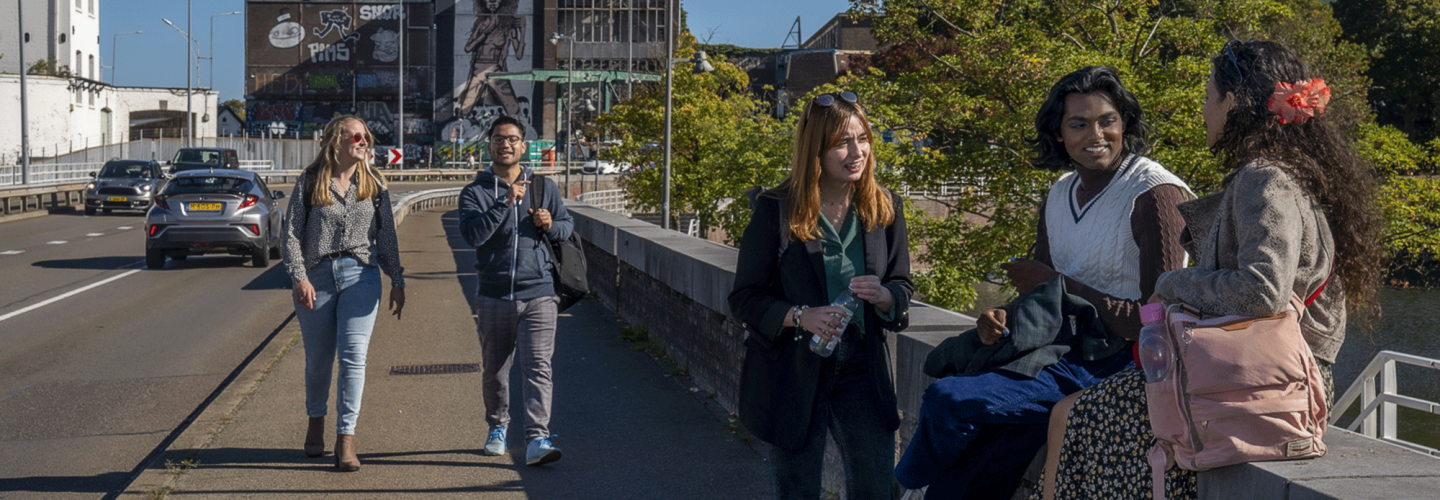Courses & curriculum
Urban Sustainability Studies is a unique bachelor’s programme for curious minds who are passionate about sustainability, ready to tackle the world’s most pressing challenges and keen on travelling. You will study at three European universities. It is hard to find a more international urban sustainability programme anywhere else!
Academic advisor
From your very first year, you will have the freedom to choose the courses and minors that you like best. You can shape your journey by selecting subjects that match the themes and topics you're passionate about. And you won’t be doing it alone; our Academic Advisors are here to support you every step of the way, helping you find the courses that fit your interests and future goals.
Your programme
The 3-year bachelor’s programme is divided into 6 semesters. In your first year (2 semesters) at Maastricht University, you build a strong multidisciplinary foundation. You focus on natural sciences, engineering, and quantitative methods while also getting key insights from social and life sciences.
Curriculum overview
Semester 1 - period 1
- Engineering in a Circular Economy
- Sociological Perspectives
- Cities and Citizens in Urban History A
Semester 1 - period 2
- Sustainable Development: an Introduction
- Statistics
- Cities and Citizens in Urban History B
Semester 1 - period 3
- Academic skills project
Semester 1 - period 4
- A Complex Systems Perspective on Urban Sustainable Development
- Elective
- Contemporary Urban Developments A
Available electives period 4:
- Introduction to Earth Sciences
- Introduction to Chemistry
- Introduction to Physics
- Chemical Engineering
- Supply Chain Management
- Climate Change
- Theory construction and modelling techniques
Semester 2 - period 5
- Elective
- Principle of Economics
- Contemporary Urban Developments B
Available electives period 5
- Introduction to Biology
- Ecology
- Philosophy of Science
- Foundations of EU Law and Policy
- Ethics
- Remake, Reuse, Repair, Recycle
- Circular Business Development
- Behaviour change
Semester 2 - period 6
- Research methods project
Semester 3-5
You will choose 3 minors from the list below, with at least 2 from different universities outside of the Netherlands. Each minor includes an interdisciplinary challenge course, where you will team up with 8–10 students from diverse backgrounds to tackle a real-world urban issue together.
Spain - Universidad Carlos III de Madrid
- Energy Sustainability in the Cities
- Smart Cities for Sustainable Culture
- Economic Development
Germany - University of Bremen
- Natural Sciences for Sustainability
Poland—Nicolaus Copernicus University
- Urban Health & Wellbeing
- Sustainable Tourism
Cyprus - University of Cyprus
- Urban Environmental and Sustainability Education
Finland - University of East-Finland
- Borders, Europe & Russia
- Sustainable Business
Croatia - University of Rijeka
- Urban Inequality
- Urban Ecology
United Kingdom - University of Essex
- Driving Change: Activism, Engagement and Communities
- Societal Issues in a Contemporary World
- Cities of Dreams and Nightmares
Belgium - University of Antwerpen
- Cities & Urbanisation: Interdisciplinary Perspectives
- Design and Perspectives on Heritage
- Heritage and Perspectives on Design
France - Université Sorbonne Nouvelle
- Urban Ecology in Europe: Public Policies, Cultural Narratives
Netherlands- Maastricht University
- Urban Mining
- Degrowth
- Talking to the City
Semester 6
Back in Heerlen & Maastricht, your final semester starts with elective courses. These courses will help you focus on your bachelor's thesis, future master’s programme or your career goals. In the last part of the semester, you will work on your bachelor's thesis.
Minors
At Maastricht University, Urban Sustainability Studies offers a choice between three minors, allowing you to specialise in your favourite field of urban sustainability. Of course, you can also choose from the minors offered by the YUFE partner universities.
Urban Mining
Curious about how cities can become more sustainable and how we can reuse materials in smart ways? Welcome to “Urban Mining”, an exciting minor that dives into the world of circular economy and sustainable materials in urban environments.
In this minor, you will explore how to identify, extract, and reuse valuable materials from buildings and infrastructure, turning waste into treasure. By blending materials science, circular economy, and urban sustainability, you will help tackle some of the biggest challenges we face today: resource shortages, waste reduction, and the transition to a fully circular economy.
Degrowth
The minor “Degrowth” explores alternative ways to achieve ecological sustainability and social well-being beyond traditional economic growth. You will dive into the concept of degrowth, which challenges the idea of endless expansion and offers solutions to reduce environmental impact and inequality. The goal is to rethink economic models that respect our planet’s limits while promoting human well-being. It is time to explore a future where prosperity is about more than just growth.
Talking to the city
"Talking to the City" is your chance to explore how big data & artificial intelligence can make cities smarter and more sustainable. This upcoming topic dives into how AI can help cities solve urgent problems like water management, transportation, waste, and even health and inequality, all in real-time!
Imagine using AI to help city officials and organisations communicate directly with the city to make decisions faster and better. In this minor, you will get to test out cutting-edge ideas to transform urban living and build a more sustainable future. Ready to be part of the next wave of city innovation?
